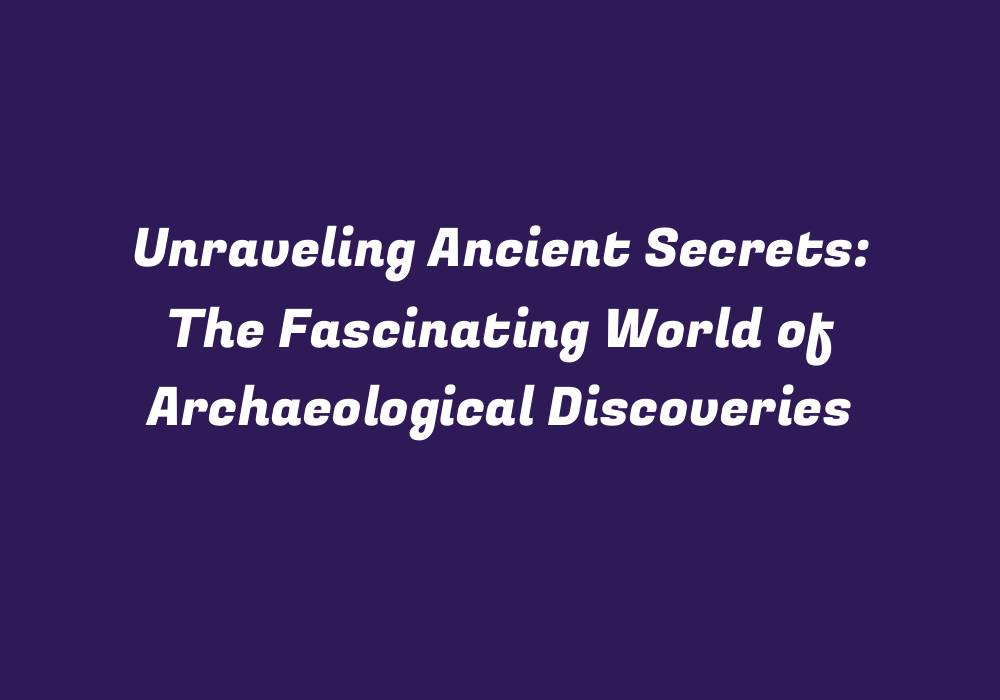Introduction: Unveiling the Past – A Journey Through Archaeological Discoveries
Archaeology, as a science that studies past human societies through their material remains, holds immense power in helping us understand the history of humankind. Over the centuries, this discipline has revealed countless ancient secrets, broadening our knowledge about various aspects of our ancestors’ lives. Let’s delve into some fascinating archaeological discoveries and the impact they have had on our understanding of past cultures.
Unraveling the Mysteries of Ancient Civilizations
From the grandeur of Egypt’s pyramids to the intricate artistry of Mesopotamia, several ancient civilizations have left an indelible mark on our collective memory. Archaeology has been instrumental in unveiling their secrets and reconstructing their ways of life. For example, the discovery of the Royal Tomb at Ur in Iraq revealed an extensive amount of information about ancient Sumerian culture, including their religious practices and societal structures.
The Dawn of Cultures: Prehistoric Artifacts and Early Humans
Prehistoric artifacts have also allowed us to gain insights into the earliest human cultures. The discovery of the 3.4 million-year-old remains of Australopithecus anamensis, a prehuman species, revealed new details about our ancestral lineage and the evolutionary path that ultimately led to modern humans. Similarly, excavations at Peking Man’s cave in China, dating back to around 780,000 years ago, provided valuable information on human ancestors’ behavior, diet, and lifestyles.
Early Civilizations: The Birth of Writing
The study of ancient languages has been a critical aspect of archaeology, especially when it comes to deciphering the secrets of long-lost cultures. One such discovery was the Rosetta Stone, which contained an inscription written in three different scripts (Egyptian hieroglyphs, Demotic script, and Greek alphabet). By understanding these writing systems and their interrelationship, archaeologists could unlock a wealth of knowledge on ancient Egyptian culture, including its history, religion, and daily life.
The Roman Empire’s Legacy: Archaeology as a Time Capsule
Archaeological sites in the Roman Empire have revealed details about the lives of ordinary citizens, from their housing to social customs. The remains of Pompeii, preserved by volcanic ash after Mount Vesuvius erupted in 79 AD, offer a remarkably vivid snapshot of everyday life during the time of the Roman Republic and the early Empire. Similarly, discoveries at Hadrian’s Wall in England have provided essential information about the Roman Army’s presence and activities along the frontier.
Reviving Lost Cultures: The Maya Civilization and Beyond
The ancient Maya civilization, once believed to be a largely forgotten people group, has been resurrected through archaeological investigations in Mexico, Belize, Guatemala, Honduras, and El Salvador. These studies have revealed a highly developed society with sophisticated artistry, advanced mathematics, and unique hieroglyphic writing. Furthermore, the unveiling of this rich culture has prompted a re-examination of other lesser-known ancient civilizations such as the Olmecs, Teotihuacán, and Monte Albán in Mesoamerica.
Tracing Human Migration: The Role of Archaeology in Historical Geography
Archaeological discoveries have also allowed for a better understanding of human migration patterns throughout history. For instance, the recent findings at the Sekisai cave site in Japan revealed that people were living there around 30,000 years ago during the Upper Paleolithic period. This suggests that ancient populations may have moved across land bridges between Asia and North America even before the last Ice Age, challenging previous theories about human migration.
Preserving our Past: Archaeology’s Role in Heritage Conservation
As archaeological discoveries continue to unravel the complexities of human history, it is vital to preserve these cultural treasures for future generations. By fostering public awareness and promoting responsible conservation practices, we can ensure that the stories and artifacts unearthed by archaeology remain accessible for learning and inspiration.
Conclusion
The field of archaeology has brought us closer to our ancestors’ lives, offering invaluable insights into ancient civilizations and their achievements. By unraveling the secrets that lay buried under the Earth, archaeologists have revealed new perspectives on human history and culture. As we continue to explore the past, these discoveries will only further expand our understanding of the complex journey that has shaped humanity throughout time.
